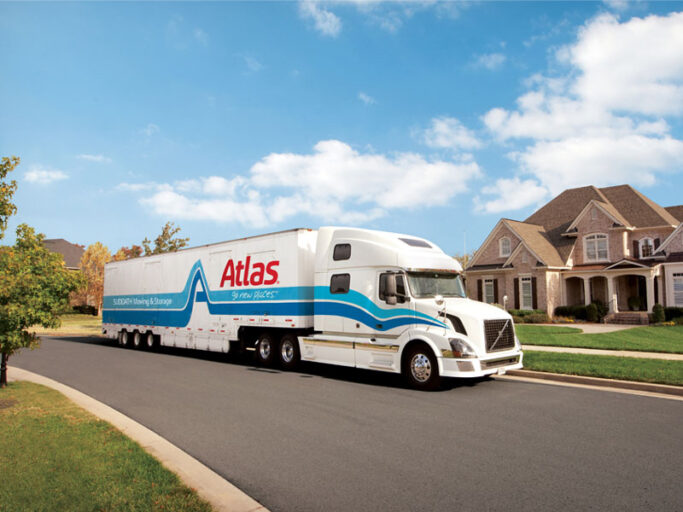Moving Tips & Resources
What is the Average Cost of Full-Service Movers?
When you’re planning to relocate, it’s wise to consider moving costs as you make your budget. Costs will vary, though, based on certain key elements. First, the distance of the move can make a difference, and so can the weight of the household belongings being transported—and their dimensions. The time of year can also make a difference with more in-demand times sometimes coming with higher costs.
Plus, because we’re talking about the cost of full-service movers, the additional services you select—such as packing services and storage—will also be factored into the estimate.

Average Cost of Full-Service Movers in Texas
At Daryl Flood, we recognize how busy you are when planning a move, and we respect your time. So, to quickly get information about the cost of your move in Texas, just reach out to us. A full-service move’s price is influenced by many factors, such as distance and specialty services required, so reaching out is best for an accurate number. We recommend reaching out to at least three moving companies to get an idea of what your move will cost, and to feel comfortable with those prices.
Now contrast that to a DIY move. Although it’s true that a DIY move can save you some money in exchange for putting in all the labor, DIY moves also come with costs. Renting a moving truck typically comes with a deposit, and you can make a couple of quick calls to find out the current prices. The price will generally vary based on the size of the truck you’ve rented, and you’ll need to pay for the gas. Then, you’ll need boxes, packing supplies, and so forth—and, if you’re going to offer some money to friends and family members who pitch in to help, include that in the cost of your DIY move.
In short, be sure to consider the cost difference between a full-service move and a DIY one when making your decisions.
Here’s more about factors that can affect the cost of a full-service move.
Weight of Belongings
Weight of your household items can be a significant factor in the move’s cost. Fortunately, most people have some control over this factor; here are strategies to consider:
- Start as early as you can and break the process into manageable chunks.
- Think about the benefits of decluttering, including but not limited to the weight that can be reduced before your relocation.
- Identify items that have clearly outlived their usefulness and recycle or throw them away.
- Toss expired food items from your refrigerator, freezer, and pantry. If you don’t want to throw away food that might be good, check the U.S. Department of Agriculture guidelines and, when possible, consume the food before your move. Movers typically won’t transport perishable foods but may take canned and boxed goods.
- Get rid of outdated medicines. The Texas Attorney General notes how you can contact your local police department for disposal; ask if they accept ones with narcotics or other controlled substances. You can also ask the police or your doctor or pharmacy about mail-back packages for your unused prescriptions. In the spring and fall, and possibly additional times, the Drug Enforcement Agency (DEA) hosts “Drug Take Back Days.”
- Consider items you no longer have a need for but are still useful. You could:
- hold a rummage sale and get money towards your move
- offer these items to a consignment shop and get money towards your move
- give them to friends and family members who would appreciate them
- donate them to a charity of choice; the Texas Department of Criminal Justice lists dozens of approved charitable agencies. See which ones would take your old magazines, clothing you won’t wear anymore, children’s clothing that they’ve outgrown, cables for electronics, and so forth. See if your veterinarian or local animal shelter could use your old sheets, blankets, and towels.
- Before you include heavy furniture in your moving quote, ensure that it will fit, size-wise, in your new place and that you want to take it with you. If, for example, you plan to buy a new sofa and armchairs for your new home, do you need to transport your current ones?
Here are a couple other weight-related factors:
- If your moving company doesn’t ask you about weight, that could be a red flag because moving trucks can only legally drive with certain weight amounts.
- Verify any extra costs if you’re moving, for example, heavy furniture. You could also ask about bulky items or fragile ones needing special attention.
Each situation is unique but, by going through these steps, you can help to ensure that you’ll require transportation for the lightest amount of weight possible while also getting an accurate quote.
Storage Services
As you’re going through belongings and deciding what to keep and what to toss, donate, or sell, some decisions may be pretty straightforward. In other cases, though, you may have household goods where you just aren’t sure what to do with them. In that case, you could put them into one of our storage facilities to give yourself more time to decide. In this scenario, as far as the cost of storage services goes, this could be offset by the amount you save via a lighter weight when transporting your household goods.
Other reasons why you may want storage services in tandem with your move include the following:
- Your new home isn’t ready yet, and you need to have a place to keep your belongings in the interim.
- You’re needing to prune back what you take on a new military assignment.
- You want to remove excess belongings from your current home to stage it for sale.
- You’ll be renting an apartment in your new town while looking for a home to buy; the apartment won’t have the same amount of space as your home.
Again, each situation is unique. If you find that you’ll need storage services, this will be factored into the cost of your relocation.
Packing Services
Packing services are another in-demand add-on. When an experienced team packs your belongings, this can save you plenty of time, and you can be reassured that they’re professionally packed before transportation.
When you’re relocating, you’ve already got numerous issues to juggle—from getting utilities in your old place turned off and ones in your new place turned on, transferring school records, ensuring you’ve got all the necessary paperwork close at hand, and so forth—and taking advantage of packing services frees you up for those tasks. It will get done more quickly, too, with movers having the expertise and proper materials and equipment to get the job done right. If you choose to have packing services included in your quote, that will affect the price.
Contact Daryl Flood for Your Move Today
As you can see, although the average cost of full-service movers in Texas may be about $4,500 each move comes with its own specific components and associated costs. You may also decide to tip your movers, which is an individual choice.
Although information about the cost of full-service movers can be helpful, what’s most important is to get an accurate estimate for your own move. To ask questions or to get started on your relocation, simply contact us online. For more than forty years, we’ve been serving customers like you in Austin, Dallas, Fort Worth, Houston, and San Antonio, Texas.
We provide full-service moves—local, long distance, and international. Our mission is to serve our customers, communities, and each other with the highest level of care, and you have our promise that we will extend this courtesy and provide this level of dependability to you and your family.
Our quotes? Reliable and fully guaranteed. Plus, from start to finish, you’ll have access to your dedicated move coordinator who will answer all your questions and keep you up to date on your move’s progress.





